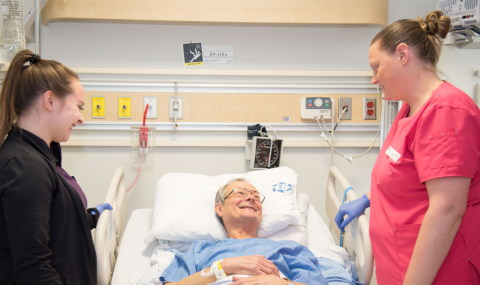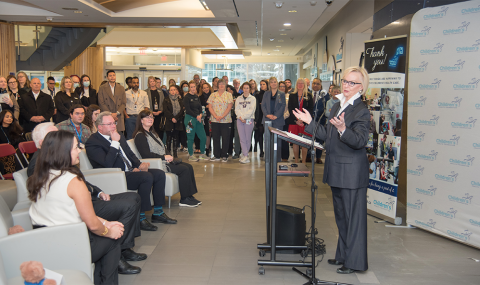MEDIA RELEASE
For Immediate Release:
December 8 , 2011
Enrollment in program to train Canada’s
‘surgeons of the future’ grows to record high in 2011
Rise of minimally invasive surgery to continue in Canada, with promise of positive impact on patient recovery and health system costs
LONDON, ON – A surgical training program designed to prepare ‘surgeons of the future’ in the practice of minimally invasive surgery (MIS) achieved record high enrollment in 2011 – up nearly threefold from 2008 – and will continue to climb in 2012, London Health Sciences Centre (LHSC) announced today.
Designed to give developing surgeons hands-on training in innovative and revolutionary cognitive and technical aspects of gastrointestinal endoscopy, video endoscopic and emerging technologies and minimally invasive techniques, The Society of American Gastrointestinal and Endoscopic Surgeons (SAGES) training courses conducted at the London Health Sciences Centre through CSTAR (Canadian Surgical Technologies and Advanced Robotics) will have trained 48 surgical residents by the end of 2011 during three separate courses, compared to 18 participants in 2008. For the first time, the course has generated a waiting list of surgical residents from across Canada, and will be further expanded in 2012, training up to 75 surgeons. SAGES is a globally recognized organization that provides leadership in surgery, particularly gastrointestinal and endoscopic surgery, in order to optimize patient care through education, research and innovation. SAGES represents more than 6,000 surgeons and allied health professionals.
“We are pleased that LHSC’s CSTAR program is helping to train the next generation of Canadian surgeons,” states Bonnie Adamson, president & chief executive officer of London Health Sciences Centre. “The partnership between CSTAR and SAGES provides leading-edge training that can be directly applied to patient care.”
“The growth and success of this program to train surgeons of the future in the evolving practice of minimally invasive surgery, are very important developments for Canadian healthcare, with the potential to deliver benefits both for patients and our burdened healthcare system” said Dr. Christopher Schlachta, Medical Director for CSTAR, and Professor of Surgery and Oncology, Schulich School of Medicine and Dentistry, The University of Western Ontario.
Minimally invasive surgery will play an increasingly pivotal role in the Canadian healthcare system, he added, by enabling shorter hospital stays, lower infection and readmission rates, a quicker return to normal for patients and lower institutional costs. Based on clinical evidence and expert recommendation, a minimally invasive approach can be considered the best option in the treatment of many benign and malignant gastrointestinal diseases, particularly in areas such as colon cancer.
“Today’s surgeon needs to be proficient in minimally invasive technical skill sets,” said Dr. Allan Okrainec, CSTAR-SAGES Resident program faculty, Program Director, Minimally Invasive Surgery Fellowship and Director, Temerty/Chang Telesimulation Centre, University Health Network, University of Toronto. “With an increasing number of procedures being routinely performed laparoscopically, the contemporary general surgeon needs to be able to perform basic and advanced laparoscopic procedures. This program helps Canadian residents acquire these important surgical skills”.
One 2011 participant in the SAGES program at LHSC’s CSTAR called it a crucial initiative for Canadian surgeons, with positive benefits in store for patients and the entire health system.
“Education for surgical residents in Canada has taken tremendous strides forward under the SAGES program offered through LHSC’s CSTAR, and those of us participating at this stage feel truly privileged to be involved in this exciting opportunity to advance MIS training,” said Dr. Kelly Vogt, Chief Surgery Resident, The University of Western Ontario. This training supplements and addresses current gaps in surgical resident curricula, and enables our further development as surgeons dedicated to optimizing patient outcomes across a number of surgical procedures.”
“We have enjoyed tremendous success in the U.S. with our resident training courses and we are proud to be working with LHSC and CSTAR in London, Ontario to raise the profile of SAGES and make the program such a success in Canada,” said Dr. Steven Schwaitzberg; SAGES President. “We are thrilled with what has been accomplished and we are looking forward to providing continued support of CSTAR in our role as thought leaders in this extremely important and evolving area of surgery and healthcare. Enrollment continues to rise and 2012 will be another outstanding year of advances in surgical resident training.”
-30-
About London Health Sciences Centre
London Health Sciences Centre has been in the forefront of medicine in Canada for 136 years and offers the broadest range of specialized clinical services in Ontario. Building on the traditions of its founding hospitals to provide compassionate care in an academic teaching setting, London Health Sciences Centre is home to Children’s Hospital, South Street Hospital, University Hospital, Victoria Hospital, two family medical centres, and two research institutes – Children’s Health Research Institute and Lawson Health Research Institute, a joint research initiative with St. Joseph’s Health Care, London. As a leader in medical discovery and health research, London Health Sciences Centre has a history of over 50 international and national firsts and attracts top clinicians and researchers from around the world. As a regional referral centre, London Health Sciences Centre cares for the most medically complex patients including critically injured adults and children in Southwestern Ontario and beyond. The hospital’s nearly 15,000 staff, physicians, students and volunteers provide care for more than one million patient visits a year. For more information visit www.lhsc.on.ca .
About Canadian Surgical Technologies and Advanced Robotics (CSTAR)
As a program of London Health Sciences Centre (LHSC) and a hub of surgical innovation, Canadian Surgical Technologies and Advanced Robotics (CSTAR) is a leading training facility for multidisciplinary training in minimally invasive surgery and advanced robotics. CSTAR (Canadian Surgical Technologies & Advanced Robotics) is Canada’s national centre for developing and testing the next generation of minimally invasive surgical and interventional technologies and techniques, including robotics. CSTAR trains the surgeons of the future and shares expertise around the world. Building on world and national firsts pioneered by surgeons in London, CSTAR was launched in December 2001. CSTAR is a collaborative research program of London Health Sciences Centre (LHSC), Lawson Health Research Institute (Lawson), The University of Western Ontario (Western) and St. Joseph’s Health Care, London (St. Joseph’s). For more information, visit www.lhsc.on.ca/About_Us/CSTAR/.
About Society of American Gastrointestinal and Endoscopic Surgery (SAGES)
SAGES represents a worldwide community of surgeons that can bring minimal access surgery, endoscopy and emerging techniques to patients in every country. SAGES represents over 6,000 surgeons and allied health professionals. The mission of the Society is to provide leadership in surgery, particularly gastrointestinal and endoscopic surgery, to optimize patient care through education, research and innovation. For more information, visit www.sages.org.
For media inquiries contact:
Michele Martin
Corporate Communications and Public Relations
London Health Sciences Centre
519-685-8500 Ext 77062
Michele.Martin@lhsc.on.ca


